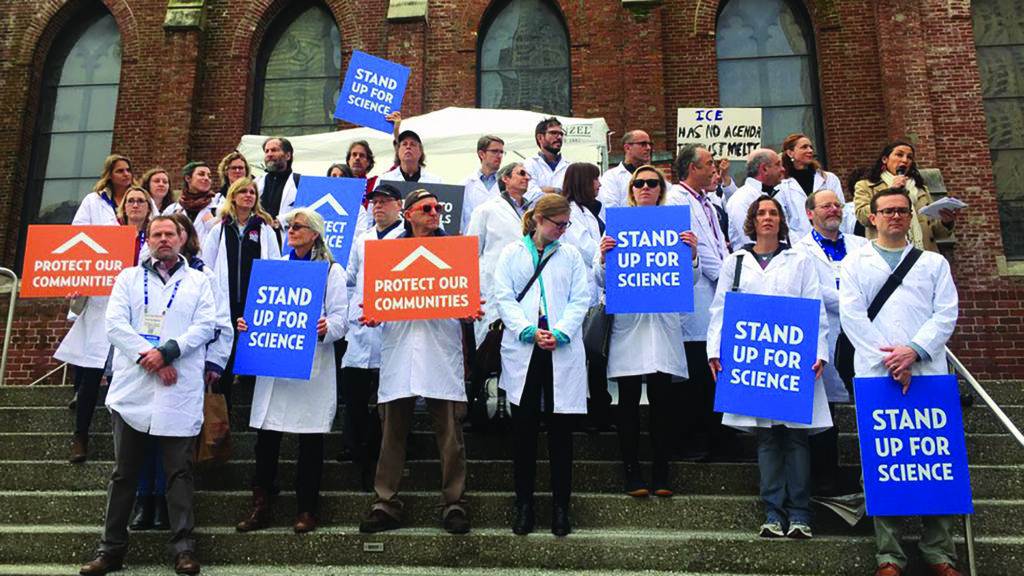Unprecedented Mobilization
in the Trump Era
BY ADRIENNE ALVORD
Last December, while many across the country and the majority in the Bay Area still reeled from the national election results, scientists held a rally at the annual American Geophysical Union conference in San Francisco to protest the Trump administration’s anti-science agenda. That event inspired thousands of scientists to mobilize, begin writing letters to their elected officials demanding they stand up for scientific integrity, and organize the first March for Science, scheduled for April 22, in cities across the country.
Last December, while many across the country and the majority in the Bay Area still reeled from the national election results, scientists held a rally at the annual American Geophysical Union conference in San Francisco to protest the Trump administration’s anti-science agenda. That event inspired thousands of scientists to mobilize, begin writing letters to their elected officials demanding they stand up for scientific integrity, and organize the first March for Science, scheduled for April 22, in cities across the country.
The good news is that scientists are not sitting on the sidelines while our communities’ health and safety are threatened. Scientists are mobilizing as fast as they can because they recognize how much is at stake.
The Union of Concerned Scientists (UCS), with its network of 20,000 scientific experts—more than 3,000 and growing in California—and 500,000 supporters, have not been silent in the face of an administration that is filling its ranks with people like ExxonMobil CEO Rex Tillerson, whose company has worked to confuse the public about climate change, or politicians like newly appointed EPA administrator Scott Pruitt, who in recent years has actively sued the agency he now runs to prevent it from enforcing clean air and clean water safeguards.
Drawing upon nearly 50 years of experience, UCS (with its West Coast office in Oakland) has positioned itself as a leading watchdog of the new administration and defender of science-based public policy. The UCS Science Network was formed during George W. Bush’s administration as a response to what scientists across federal agencies were reporting of misuse and political interference in science: their work was being suppressed, manipulated, or distorted—from drug approvals and educational policies to endangered species determinations and climate change assessments. Today there is a resurgence of these attacks on science. In the months to come, the network of scientist watchdogs will scrutinize legislation, budgets, and proposed regulations that serve special interests above the public interest, stand up for scientific integrity, and mobilize the scientific community and the broader public to fight for science-based safeguards and policies.
“Americans recognize that science is critical to improving our quality of life, and when science is ignored or politically corrupted, it’s the American people who suffer,” said physicist Lewis Branscomb, a UCS member and professor at the University of California, San Diego, School of Global Policy and Strategy who has served as vice president and chief scientist at IBM and as director of the National Bureau of Standards under President Richard Nixon. “Respect for science in policymaking should be a prerequisite for any cabinet position,” he said.
Of paramount concern are climate change and other vital issues of public health and safety, which are catalyzing an upswell and trend of activism by scientists. In the months since the election, there have been numerous initiatives and letters signed by thousands of scientists standing up for the importance of science in our democracy. A letter initiated by Dr. Aaron Parsons of UC Berkeley was signed by 2,200 faculty from the University of California and California State University systems. The organization 500 Women Scientists was launched just days after the election, and their letter was signed by more than 10,000 women scientists from all around the world in just one week. UCS organized an open letter to the Trump administration calling on it to protect federal funding for scientific research and ensuring scientists are protected from harassment. The letter was signed by more than 5,500 scientists, including 22 Nobel Laureates.
Indeed, a majority of Americans across party lines support climate action, according to a nationally representative survey conducted by the Yale Program on Climate Change Communication after the election. Seven in 10 registered voters (69%) said the US should participate in the Paris Climate Agreement; 62% wanted then president-elect Trump and Congress to do more to address global warming; and a majority of registered voters said corporations and industry should do more to address global warming (72% of all registered voters, including 87% of Democrats, 66% of Independents, and 53% of Republicans). Californians are similarly concerned, where 81% view global warming as a serious threat to the state’s future economy and quality of life and where two in three Californians (67%) favor state climate action, independent of the federal government, to address global warming, while 26% are opposed.

More than ever, scientists need our support. Bay Area residents can take these three steps now to stand up for science during this most critical time:
- Join the Union of Concerned Scientists’ watchdog teams on LinkedIn (LinkedIn.com/groups/8540478) and Twitter (Twitter.com/SciNetUCS) to keep up with news about attacks on science and ways to take action.
- Speak out in your community, in your local paper, and to your elected officials about your commitment to supporting scientists.
- Join the April 22 March for Science. And, on April 29, continue sharing your enthusiasm for science at the People’s Climate March. Visit MarchForScienceSF.com and Peoples Climate.org for details.
Adrienne Alvord is the Western States Director at the Union of Concerned Scientists in Oakland.